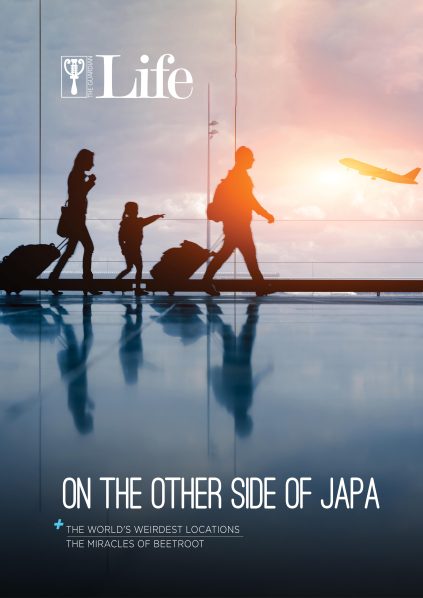
Japa, japa…
Since finding its way into the Nigerian lexicon and being perceived as the latest biggest movement after Afrobeats, Nigerians are emigrating from Africa’s biggest economy in droves, leading to an increase in the population of Nigerians residing in the United Kingdom from about 90,000 in 2008 to 178,000 in 2021.
UK’s Higher Education Statistics Agency said earlier in the year that the number of Nigerian students in the country rose by 69%, spiking from 13,020 in the 2019/2020 academic session to 21,305 by the 2020/2021 session. Canada and Scandinavian countries have also welcomed Nigerians, especially the youth, who seek better deals from life.
[ad]
Japa, a Yoruba slang which means “to run, flee or escape”, has taken root in the minds of young Nigerians and become something they aspire to, in hopes of a better future in a more structured system. But while these young citizens seek greener pastures in other countries, it spells doom for the Nigerian economy and the now-distant relationships between those who choose to remain and those who leave.
Tolu Aworojolu, a credit analyst, tells Guardian Life that there has been an extraordinary spike in travel loans since October 2021, with his company doing over ₦1 billion in value from that time to the time of writing.
Many young people who have travelled out of the country blame economic hardship for their emigration.
Welcome to a new dispensation
Not everyone who applies to japa succeeds. In a society that wears a tag as one of the most religious countries in the world, it is not uncommon to see citizens praying for intended travellers among their relatives and other members of religious societies.
Notwithstanding the increasing number of Nigerians leaving to other seemingly better countries, relocation plans are often shrouded in secrecy, perhaps in fear that sharing their plans would hamper them from becoming a reality. In fact, in most African societies, information about this is kept secret until the emigrant successfully makes it to the other side.
To celebrate one’s success following the rigorous and slow progress of relocation, an announcement and a meme of Nollywood actress Sola Sobowale raising a glass of wine (a still from a scene in the hugely popular film, King of Boys) is often posted on several social media pages with a caption on it that reads, “Welcome to a new dispensation,” signifying that the poster has successfully left the country for greener pastures.
To put this into perspective, a viral video of a crowded Murtala Muhammed International Airport, Lagos, surfaced on the internet in September 2022 showing Nigerians in disrupted queues waiting their turn to board. But the video does not tell the true story: what is certain is that not everyone that leaves Nigeria is relocating permanently.
While millions of Nigerian youths would love to relocate to “saner climes,” some travel only to return to their fatherland a short while later.
The loss of valuable professionals
As the number of people leaving the country rises, many who still struggle to raise funds remain hopeful.
Zina Odinaka ran a successful business in Nigeria before she decided to pack her bags to the UK, leaving behind her ailing parents. “I seriously started considering it after my cousin told me how much he makes after tax,” she said.
She found that after excluding all the necessary expenses, and “combined with the fact that it is a working environment”, one would still be able to send a substantial amount of money home to relatives in Nigeria.
In addition to that, the high conversion rate from forex to naira makes jobs in the US and the UK very enticing. At this time, a dollar sells at about ₦735 in the black market.
One would think that relocation would be less appealing to a person who owns a successful business in Nigeria, but the appeal to relocate is much more than the money for many citizens.
“My business here can put food on my table and fuel my car, I agree,” Odinaka said. “But what if something life-changing like an accident happens to me? If they cannot fix such an important system (health) when I need it, when will they now do this?”
Odinaka is not alone. Many Nigerian professionals are also leaving their positions. The healthcare sector has been hit the hardest by this. The Nigerian Medical Association (NMA) puts the current ratio of doctors to patients at one doctor to 4,000-5,000 patients.
But it is not always lush green for everyone, including doctors. A recent BBC report said foreign doctors, many of them Nigerians, are being exploited by the British employers, with their health at risk and outrageous deductions made on their salaries.
“I knew that working tired puts the patients at risk and puts myself also at risk, as well for litigation,” a young Nigerian doctor Augustine Enekewchi told BBC. “I felt powerless… helpless, you know, constant stress and thinking something could go wrong.”
Still, some still prefer to be subjected to such harsh realities in the UK than to live better off in Nigeria.
The strain on close relationships
A 2021 poll by the Nigeria Social Cohesion Survey revealed that 49% of the responders “feel disappointed in Nigeria” and 78% hope to relocate with their families.
Leaving behind her ailing parents, Zina says that, although some members of her extended family are scattered in different countries, the countries share similar time zones and this will help them maintain constant communication.
Not everyone is this lucky, though. Some may never see their relatives and friends again for years.
Toba [not real name], the first in his family to leave the country, has successfully relocated with about ₦4 million as proof of funds. He has chosen a small European country where the number of Nigerians is pegged at approximately 100.
“The postgraduate tuition is cheap, and it is a stepping stone. The main thing is to first leave Nigeria so that anything I am applying for in the future will not have a Nigerian address. It is not my final destination.”
Though Toba misses his family and still struggles to find his footing to the new territory, to him, starting afresh is for the best. He has his eyes on greater sights.
“I don’t think I want to return to Nigeria, but things might change in the long run. I have plans of coming back to develop my country, but this is after developing myself. I understand I cannot do much to change things in Nigeria as a poor man, so getting money will help me effect the change that I want.”
Possible journeys back home?
“The problem is not the number of people that have left, which has been greatly exaggerated by the media, but it is the number of people willing to dump Nigeria in a heartbeat if they are given the chance,” said travel writer Ademola Babalola.
Every young Nigerian fleeing the country does so out of desperation and the hope for a brighter, saner future where their simple lives are not affected by inefficient systems and corrupt institutions. But many would flock back to a more promising country with better leadership.
[ad unit=2]








